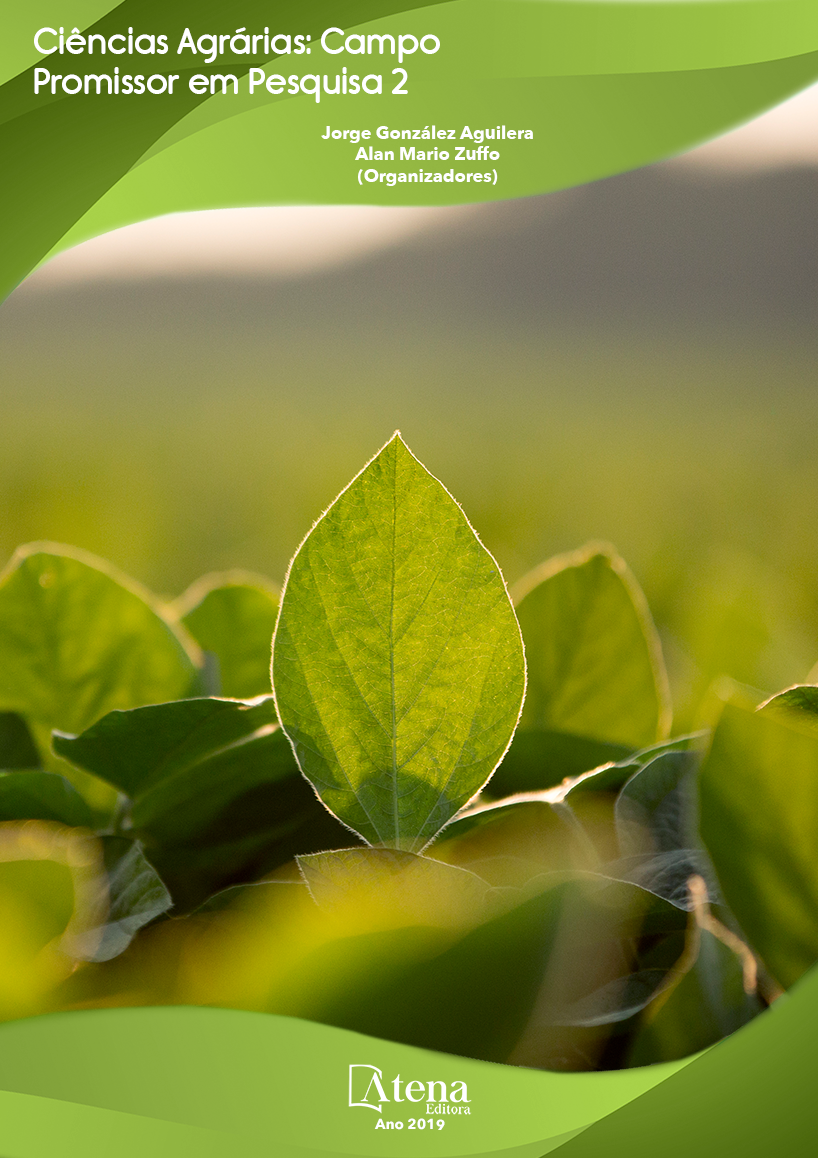
PRODUTIVIDADE DE AMENDOIM SUBMETIDO A DOSES DE GESSO NO FLORESCIMENTO E ADUBAÇÃO FOLIAR COM BORO EM REGIME DE SEQUEIRO E IRRIGADO
O amendoim é uma das oleaginosas
mais cultivadas mundialmente, sendo consumido
in natura, processado na forma dos mais diversos
alimentos ou destinado à extração de óleo. É
comum a utilização de fontes de cálcio para
incremento da produtividade, diferentemente do
boro que vem promovendo demanda de estudos
relacionados à sua influência na produtividade
da cultura. Nesse sentido, objetivou-se avaliar
a resposta do amendoim (Arachis hypogaea
L.), especificamente da “Cultivar BRS151L7”
a diferentes doses de gesso agrícola e
dosagem única de boro via foliar. O trabalho foi
desenvolvido na Universidade Federal do Cariri
(UFCA), Crato – CE. Utilizou-se o delineamento
experimental em blocos ao acaso, com três
repetições, sendo os tratamentos arranjados
em parcelas subdivididas; as parcelas foram
constituídas por doses de 0, 150, 300 e 500 kg
ha-1 de gesso agrícola e aplicações foliar com
dose única de 1 kg de ha-1 de ácido bórico. A
adubação foi realizada no início do florescimento.
A colheita foi realizada aos 90 DAS (Dias Após
a Semeadura). A adubação boratada ampliou
(p<0,05) a massa de 100 grãos e a massa de
grãos por vagem na área de sequeiro. O uso
de boro contribuiu significativamente para o
rendimento de grãos na área de sequeiro. A
aplicação de boro via foliar aumentou de forma
significativa as variáveis de desenvolvimento e
produtividade do amendoim e o uso de gesso
não demonstrou efeito significativo nas condições de solo testadas em virtude da
realização de calagem no ano anterior.
PRODUTIVIDADE DE AMENDOIM SUBMETIDO A DOSES DE GESSO NO FLORESCIMENTO E ADUBAÇÃO FOLIAR COM BORO EM REGIME DE SEQUEIRO E IRRIGADO
-
DOI: 10.22533/at.ed.16019200619
-
Palavras-chave: Atena
-
Keywords: borated fertilization. Arachis hypogea L. Calcium
-
Abstract:
Peanut is one of the most cultivated oleaginous worldwide, being
consumed in natura, processed in the most diverse food or destined to extraction of oil.
Its use is common as sources of calcium for increasing the productivity, differently from
boron that has been promoting study demand related to its influence in the culture’s
productivity. In this sense, we aimed to evaluate the answer of peanut (Arachis hypogaea
L.), specifically the variety “BRS151L7” in relation to different doses of agricultural
plaster and the unique dose of boron through foliar via. The article was developed in
the Federal University of Cariri - UFCA, in the city of Crato-CE, Brazil. We used the
experimental design in randomized blocks, with three repetitions, and the treatments
were subdivided in parcels; the parcels were constituted of agricultural plaster in doses
of 0, 150, 300 and 500 Kg ha-1 and foliar applications with the unique dose of 1 Kg
of ha-1 boric acid. The foliar fertilization was performed at the beginning of flowering.
The harvest happened at 90 DAS (Days After Seeding). The boric foliar fertilization
expanded (p>0,05) the weight of 100 grains and the weight of grains by pod in the
dry area. The use of boron contributed significantly for grains yield in the dry area.
The boron application through foliar via increased significantly the variables of peanut
development and productivity and the use of plaster did not demonstrate significant
effect in the tested soil conditions due to the realization of liming in the previous year.
-
Número de páginas: 15
- felipe thomaz da camara
- renan castro lins
- daniel yuri xavier de sousa
- antonia flávia costa souto
- cicero cordeiro pinheiro
- gilberto saraiva tavares filho
- jucivânia cordeiro pinheiro
- rafael silva de sousa
- artur dos santos silva
- antonio alves pinto
- leandro alves pinto
- marcos silva tavares


